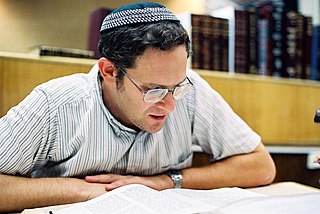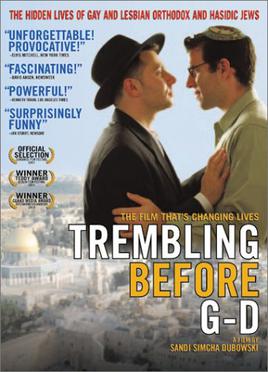A rabbi is a spiritual leader or religious teacher in Judaism. One becomes a rabbi by being ordained by another rabbi—known as semikha—following a course of study of Jewish history and texts such as the Talmud. The basic form of the rabbi developed in the Pharisaic and Talmudic eras, when learned teachers assembled to codify Judaism's written and oral laws. The title "rabbi" was first used in the first century CE. In more recent centuries, the duties of a rabbi became increasingly influenced by the duties of the Protestant Christian minister, hence the title "pulpit rabbis", and in 19th-century Germany and the United States rabbinic activities including sermons, pastoral counseling, and representing the community to the outside, all increased in importance.

Haredi Judaism is a branch of Orthodox Judaism that is characterized by its strict interpretation of religious sources and its accepted halakha and traditions, in opposition to more accommodating values and practices. Its members are usually referred to as ultra-Orthodox in English; a term considered pejorative by many of its adherents, who prefer the terms strictly Orthodox or Haredi. Haredim regard themselves as the most authentic custodians of Jewish religious law and tradition which, in their opinion, is binding and unchangeable. They consider all other expressions of Judaism, including Modern Orthodoxy, as deviations from God's laws, although other movements of Judaism would disagree.

Modern Orthodox Judaism is a movement within Orthodox Judaism that attempts to synthesize Jewish values and the observance of Jewish law with the modern world.
In Judaism, a ba'al teshuvah is a Jew who adopts some form of traditional religious observance after having previously followed a secular lifestyle or a less frum form of Judaism.
Jewish fundamentalism refers to fundamentalism in the context of Judaism. The term fundamentalism was originally used in reference to Christian fundamentalism, a Protestant movement which emphasizes a belief in biblical literalism. Today, it is commonly used in reference to movements that oppose modernist, liberal, and ecumenical tendencies within societies as well as modernist, liberal and ecumenical tendencies within specific religions and it is often coupled with extremist ideologies and/or political movements. The use of this definition is important in a Jewish context because the two movements which are most commonly associated with Jewish fundamentalism, Religious Zionism and Haredi Judaism, stray far from biblical literalism due to the importance of the Oral Law within Judaism. In fact, Karaism, the Jewish movement which is well-known due to its emphasis on biblical literalism, is rarely considered fundamentalist.
Faye Marder Kellerman is an American writer of mystery novels, in particular the "Peter Decker/Rina Lazarus" series, as well as three nonseries books, The Quality of Mercy, Moon Music, and Straight into Darkness.

Conversion to Judaism is the process by which non-Jews adopt the Jewish religion and become members of the Jewish ethnoreligious community. It thus resembles both conversion to other religions and naturalization. The procedure and requirements for conversion depend on the sponsoring denomination. Furthermore, a conversion done in accordance with one Jewish denomination is not a guarantee of recognition by another denomination. Normally, though not always, the conversions performed by more stringent denominations are recognized by less stringent ones, but not the other way around. A formal conversion is also sometimes undertaken by individuals whose Jewish ancestry is questioned or uncertain, even if they were raised Jewish, but may not actually be considered Jews according to traditional Jewish law.
"Who is a Jew?" is a basic question about Jewish identity and considerations of Jewish self-identification. The question pertains to ideas about Jewish personhood, which have cultural, ethnic, religious, political, genealogical, and personal dimensions. Orthodox Judaism and Conservative Judaism follow Jewish law (halakha), deeming people to be Jewish if their mothers are Jewish or if they underwent a halakhic conversion. Reform Judaism and Reconstructionist Judaism accept both matrilineal and patrilineal descent as well as conversion. Karaite Judaism predominantly follows patrilineal descent as well as conversion.
Jewish atheism is the atheism of people who are ethnically and culturally Jewish.
Torah Umadda is a worldview in Orthodox Judaism concerning the relationship between the secular world and Judaism, and in particular between secular knowledge and Jewish religious knowledge. The resultant mode of Orthodox Judaism is referred to as Centrist Orthodoxy.
The Union of Orthodox Rabbis of the United States and Canada (UOR), often called by its Hebrew name, Agudath Harabonim or (in Ashkenazi Hebrew) Agudas Harabonim ("union of rabbis"), was established in 1901 in the United States and is the oldest organization of Orthodox rabbis in the United States. It had been for many years the principal group for such rabbis, though in recent years it has lost much of its former membership and influence.

Trembling Before G-d is a 2001 American documentary film about gay and lesbian Orthodox Jews trying to reconcile their sexuality with their faith. It was directed by Sandi Simcha DuBowski, an American who wanted to compare Orthodox Jewish attitudes to homosexuality with his own upbringing as a gay Conservative Jew.
Peter Decker is a fictional character in a series of mystery novels by Faye Kellerman. A lieutenant in the Los Angeles Police Department (LAPD), Decker is assisted in solving crimes by his Orthodox Jewish wife Rina Lazarus.
Cindy Decker is a fictional character in a series of mystery novels by Faye Kellerman. She is the daughter of the protagonist, Peter Decker, a Los Angeles police lieutenant, by his first marriage. While Cindy and her mother Jan are portrayed as Jewish, they are not as religiously observant as Peter's second wife Rina Lazarus.

From the founding of political Zionism in the 1890s, Haredi Jewish leaders voiced objections to its secular orientation, and before the establishment of the State of Israel, the vast majority of Haredi Jews were opposed to Zionism, like early Reform Judaism, but with distinct reasoning. This was chiefly due to the concern that secular nationalism would redefine the Jewish nation from a religious community based in their alliance to God for whom adherence to religious laws were "the essence of the nation's task, purpose, and right to exists," to an ethnic group like any other as well as the view that it was forbidden for the Jews to re-constitute Jewish rule in the Land of Israel before the arrival of the Messiah. Those rabbis who did support Jewish resettlement in Palestine in the late 19th century had no intention to conquer Palestine and declare its independence from the rule of the Ottoman Turks, and some preferred that only observant Jews be allowed to settle there.
Orthodox Jewish outreach, often referred to as Kiruv or Qiruv, is the collective work or movement of Orthodox Judaism that reaches out to non-observant Jews to encourage belief in God and life according to Jewish law. The process of a Jew becoming more observant of Orthodox Judaism is called teshuva making the "returnee" a baal teshuva. Orthodox Jewish outreach has worked to enhance the rise of the baal teshuva movement.
In Israel, the term status quo refers to a political understanding between secular and religious political parties not to alter the communal arrangement in relation to religious matters. The established Jewish religious communities in Israel desire to maintain and promote the religious character of the state, while the secular community sometimes wishes to reduce the impact of religious regulations in their everyday lives. Occasionally, one political side seeks to make changes to inter-communal arrangements, but these are often met by political opposition from the other side. The status quo preserves the established religious relations in Israel, and only small changes are usually made.
Sacred and Profane is a 1987 novel by Faye Kellerman. It is second in the Peter Decker/Rina Lazarus series, a Fawcett Crest book published by Ballantine Books.

Faranak Margolese is an American-Israeli writer, best known as the author of Off the Derech, a book about contemporary assimilation in the Orthodox Jewish world.





